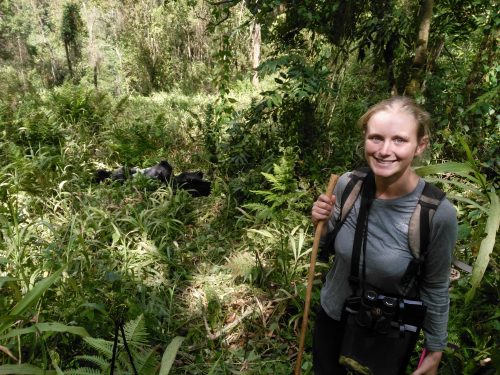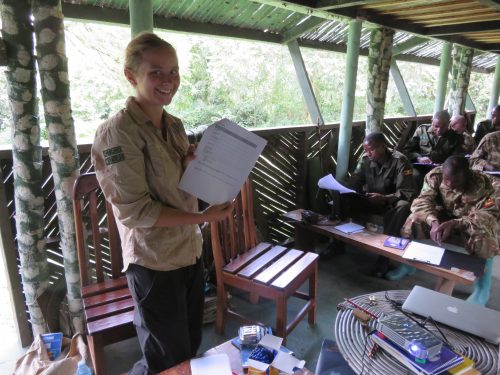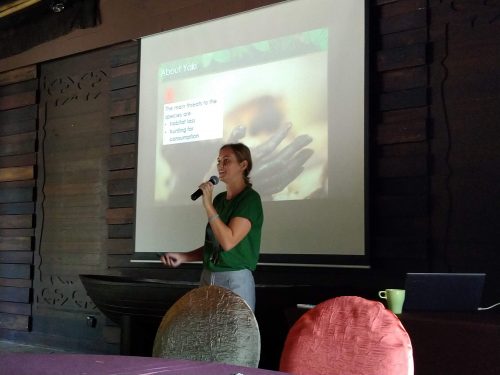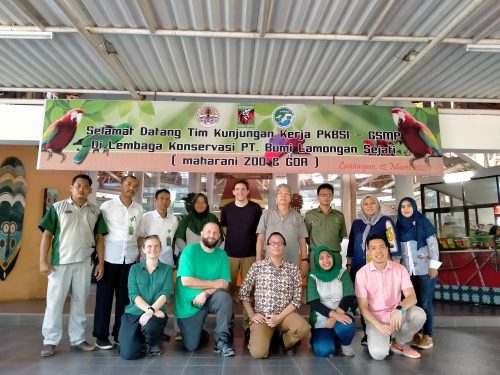We’re celebrating this year’s International Women & Girls in Science Day by sharing one of our inspiring conservation scientists journey – Corinne Bailey, Programme Officer for the IUCN SSC Asian Wild Cattle Specialist Group.

“Although I have had a lifelong interest in the natural world, I never felt an aptitude towards the ‘traditional’ sciences, and so I thought it would be impossible for me to work in science. I studied languages at University and began teaching English abroad, pursuing my interest in nature as a hobby. After a few years of distance learning and volunteering at wildlife sanctuaries in South Africa, I decided to take the leap towards a career in conservation. I had a particular interest in the interface between ex-situ (in the zoo) conservation taking place in zoos around the world and in situ (in the wild) conservation happening out in the wild, and went back to university to complete a Master’s Degree in Zoo Conservation Biology. Catching up with my peers on subjects like statistics, field methodology and scientific writing was a huge challenge, and I was proud to achieve a Distinction at the end of the course.

After graduating, I worked in a variety of field roles within applied conservation and research. This ranged from working for an RSPCA wildlife rescue centre, to living in basic field conditions in a remote island off the coast of Tanzania, collecting data on avian biodiversity and human-hippo conflict. I collected behavioural and ecological data on Critically Endangered mountain gorillas in Bwindi Impenetrable Forest in Uganda, and supported a camera trap survey by Chester Zoo searching for mountain bongo and okapi in Semuliki National Park. These applied experiences provided insight into research methodology and logistics. Throughout these projects and later work with a conservation NGO in Indonesia, I found that a range of competencies are critical to achieve conservation goals, including effective coordination and communication skills. As my career has developed, a key focus has been using these combined skills to reduce threats to biodiversity. A major achievement was developing and socialising a multi stakeholder strategy using behaviour change principles to mitigate the bushmeat trade in North Sulawesi.

In my latest position as Programme Officer with the Asian Wild Cattle Specialist Group supported by Chester Zoo, my responsibilities reflect the diversity of needs in conservation and include field project coordination, supporting relationships with European and US zoos that are partners of the Banteng, Anoa and Babirusa Global Species Management Plans (GSMPs), communications and fundraising. And yes, my language skills are still coming in handy!

To any fellow women considering a career in conservation, I would say don’t undervalue your achievements, even if your path to STEM seems fairly unconventional. During my time so far working in conservation, I have seen that there is a huge diversity of roles and ways in to the field, and that each one is integral to achieving conservation goals. I am lucky to have had inspiring female role models to look up to, that have led the way in conservation. Like many others, I have benefited hugely from their achievements. I’d like to see more women holding leading positions in even more areas of conservation in the future. Being an early career conservationist is highly competitive, requires huge amounts of dedication and flexibility and in many cases, it can be difficult to find paid work. I would encourage women interested in conservation to push aside impostor syndrome, be sure to apply for jobs that interest you, and value your achievements.”